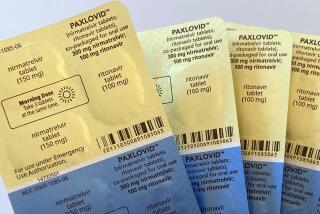In Combination, Helpful Drugs May Harm
- Share via
New medications are enabling people to live longer and better lives, but those benefiting most from these drugs should take precautions to avoid adverse drug reactions.
The geriatric population in the United States is growing at an unprecedented rate, and this population boom will accelerate in the next century as baby boomers enter the ranks of those 65 and older.
People older than 65 currently constitute 12% of the population, but they take 33% of all prescription drugs. In a recent study of elderly patients admitted to an acute care hospital, nearly one-fifth of the admissions were attributed to adverse drug reactions, which might have been triggered by the interaction of two or more medications.
*
Multiple drug use is perhaps the most common cause of adverse reactions among the elderly. It is not uncommon for older patients to take six to eight prescription and over-the-counter (OTC) drugs simultaneously for conditions ranging from headaches to heart disease.
Drug-disease interactions occur more frequently in the elderly because of the physical changes that accompany the aging process. Scientists estimate that the functional capacity of various body organs--such as the heart, kidney and brain--declines by nearly 1% per year after age 30. As the functional capacity of these organs decreases, the patient becomes more susceptible to medications. For example, beta blockers, which are blood pressure medications, can lead to heart failure in patients with heart disease, and certain arthritis medications, such as Naprosyn and Advil, can cause acute kidney failure in people with impaired kidney function.
Drugs prescribed for patients with cardiovascular disorders, such as high blood pressure, heart disease or blood clots, can also cause adverse interactions. Medications used to treat abnormal heart rhythms, such as Cordarone, could cause an accumulation in the body of the seizure medication Dilantin or the heart rhythm medications quinidine and digoxin, resulting in adverse side effects.
*
Some drugs interact with others to block their intended effect. For example, arthritis medications, such as aspirin and Motrin, and decongestants, such as Sudafed, can lessen the effectiveness of blood pressure medicines.
Patients with gastrointestinal disorders should be aware that medications used to treat heartburn or ulcers, such as Mylanta, Maalox or Carafate, may bind with various antibiotics, such as Cipro or tetracycline, reducing the ability of these antibiotics to enter the bloodstream and fight infection.
An estimated two-thirds of the elderly use nonprescription drugs. It is important to remember that medicines that do not require prescriptions can also cause adverse interactions. Three popular OTC products that could interact significantly with prescription medicines include aspirin, which is found in more than 50 OTC products; acetaminophen, the active ingredient in Tylenol; and dextromethorphan, the cough suppressant in many OTC cough medicines including Robitussin DM.
Combining aspirin or acetaminophen with the popular blood thinner warfarin can lead to internal bleeding, while mixing dextromethorphan with the frequently prescribed antidepressant Paxil may cause serious side effects, including agitation, gastrointestinal discomfort, sleep disturbances and sexual dysfunction.
*
Each year, new, more effective drugs become available. To maximize their benefits while avoiding adverse interactions:
* See only one prescriber and fill all prescriptions at the same pharmacy. Pharmacists have computerized patient profiles that contain all medications you have had filled at that pharmacy. They also have computer programs that screen for potentially toxic interactions and provide written information about possible interactions and toxicity of your medications.
* See your physician on a regular basis. Your physician will be able to detect changes in your body that may signal an increased risk for drug interactions, and may suggest a dosage reduction or change one or more of your medications.
* Be prepared to present a list of all your medicines, including OTC drugs, whenever visiting the doctor or pharmacy.
* Destroy outdated, unused medications to avoid mistakenly adding old drugs to the current treatment.
*
Pierre Jean Menard is a clinical pharmacist at the City of Hope Cancer Center and adjunct assistant professor of pharmacy practice at the USC School of Pharmacy.






